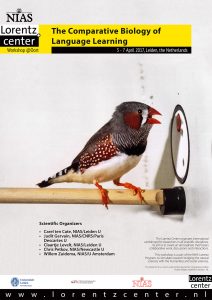NIAS-Lorentz Theme Group 2016/17: The Comparative Biology of Language Learning – Towards the Next Level
The NIAS-Lorentz Theme Group “The Comparative Biology of Language Learning” explores the evolution of language learning. The group members will carry out their intensive interdisciplinary collaboration project from 1 April 2017 until 30 June 2017.
Research Project
A central topic in the study of language acquisition concerns the nature of the learning mechanisms that are required for this task. Are general cognitive mechanisms involved, or human-specific and language-specific mechanisms? If language-specific, how do they differ from mechanisms used for other tasks? The question also relates to language evolution: why did language only evolve in humans? And what might have been the precursors of human language learning? The strongly contrasting views on these questions demarcate the current interdisciplinary ‘battlefield’ that forms the topic of this project, which aims at (1) critically reviewing and synthesizing the available evidence, to identify the insights gained by human, animal and computational studies on the topic, and (2) identifying the critical questions for future research and developing novel experimental and computational approaches to address these.
Theme Group Members
Carel ten Cate, Leiden University, Animal Behaviour
Judit Gervain, CNRS, Paris, Theoretical Linguistics & Psycholinguistics
Claartje Levelt, Leiden University, Theoretical Linguistics
Chris Petkov, Newcastle University, Comparative Neuropsychology
Willem Zuidema, University of Amsterdam, Artificial Intelligence





Workshop
The workshop The Comparative Biology of Language Learning is held from 3 April through 7 April 2017 and identified the insights gained by human (including infant), nonhuman animal and computational studies on the topic of language learning.

